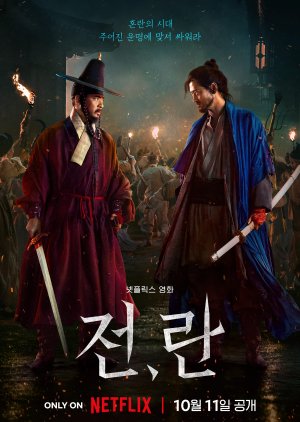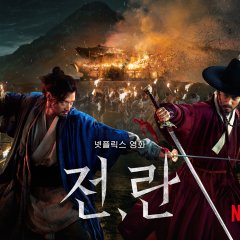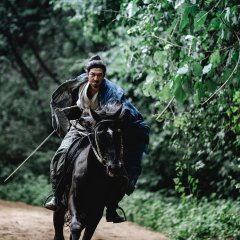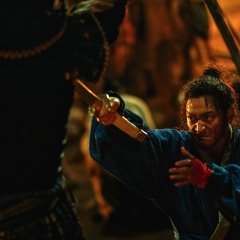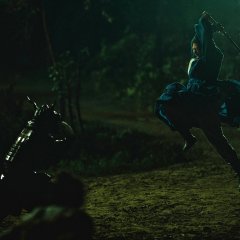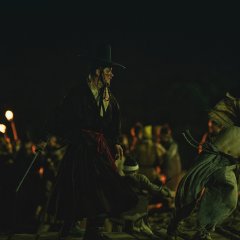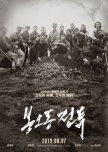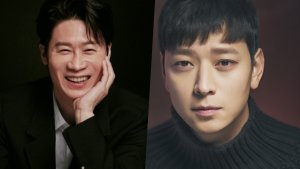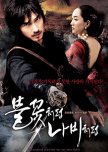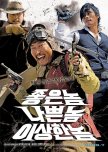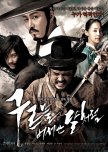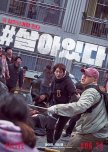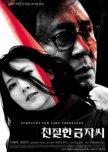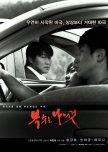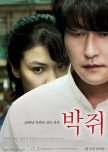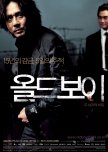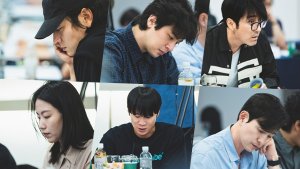 Kang Dong Won, Cha Seung Won, Director Park Chan Wook and More Confirmed for "Jeon Ran"
Kang Dong Won, Cha Seung Won, Director Park Chan Wook and More Confirmed for "Jeon Ran" - Italiano
- Arabic
- Українська
- Français
Dove Guardare Jeon, Ran
Subscription (sub)
Cast & Ringraziamenti
- Kang Dong WonCheon YeongRuolo Principale
- Park Jung MinYi Jong RyeoRuolo Principale
- Kim Shin RokBeom DongRuolo Principale
- Jin Sun GyuKim Ja RyeongRuolo Principale
- Jung Sung IlGenshin KikkawaRuolo Principale
- Cha Seung WonKing Seon JoRuolo Principale
Recensioni

Questa recensione può contenere spoiler
A HEARTBREAKING YET BEAUTIFULLY CRAFTED FILM
*Uprising* is a heartbreaking yet beautifully crafted film that takes us on an emotional journey through the friendship of Jong-Ryeo and Cheon-Yeong, set in a time of brutal class divisions in historical Korea. The plot centers on how the rigid social hierarchy affects their lives, particularly Cheon-Yeong, a slave who is forced to endure countless hardships in place of Jong-Ryeo.What starts as a cruel situation—Cheon-Yeong being beaten in Jong-Ryeo’s stead—evolves into a deep bond. Despite the fact that Cheon-Yeong isn’t born a slave, his family’s downfall forces him into this role, and it's his strength and refusal to accept the established hierarchy that makes him stand out. When he begins secretly teaching Jong-Ryeo how to fight, the dynamics between the two change, leading to a friendship that feels genuine despite the social disparity.
However, the film doesn’t shy away from the harsh realities of their world. Even after helping Jong-Ryeo win a prestigious sword-fighting competition, Cheon-Yeong is denied his freedom by Jong-Ryeo’s father, who breaks the promise of releasing him from slavery. This betrayal deeply scars Cheon-Yeong, though Jong-Ryeo still tries to protect him by sending him off to fight the Japanese invaders, hoping this will finally earn him his freedom. The film is filled with these moments of hope and crushing disappointment.
After years of fighting, Cheon-Yeong returns home only to find the world he left behind in ruins. Jong-Ryeo’s family home has been burned down by the people who suffered under the oppressive rule of his father. In one of the film’s most gut-wrenching moments, Cheon-Yeong tries to save Jong-Ryeo’s wife and son from the flames, but she refuses his help out of pride, seeing him as a slave rather than a person who might save her life. Her death serves as a stark reminder of how deeply ingrained social prejudice was, even to the point of self-destruction.
The climax of *Uprising* sees a tragic reunion between Jong-Ryeo and Cheon-Yeong after seven years of separation. Jong-Ryeo, unaware of the full story, initially believes Cheon-Yeong is responsible for his wife and son's deaths. Their final confrontation is tense, but as the truth is revealed, the film shifts focus from their conflict to a bittersweet reconciliation. Just when they finally resolve their long-standing misunderstanding, Jong-Ryeo is mortally wounded in battle against the Japanese. Cheon-Yeong kills the Japanese leader, Genshin, in a satisfying act of revenge, but it’s too late to save Jong-Ryeo.
In Jong-Ryeo’s final moments, he asks Cheon-Yeong if they’re still friends, referencing an earlier lighthearted exchange from their youth. It’s a poignant moment that captures both the tragedy and beauty of their relationship. Despite everything that has happened, the film shows that love and loyalty can persist, even in death. This scene is devastating, but it offers closure, showing that their bond was real despite the cruel world they lived in.
On a larger scale, *Uprising* also critiques the corruption of the ruling class, embodied by King Seonjo, whose greed and cowardice lead to the suffering of the common people. His alliance with the Japanese and subsequent desertion of his own throne during the invasion sparks the uprising that defines the film. The subplot involving Seonjo and the infamous Japanese leader Genshin, known as the “nose-snatcher,” adds layers of historical context and brutality to the narrative. In a symbolic twist, Seonjo’s greed is punished when the treasure he’s promised turns out to be boxes of human body parts—noses, to be precise—reflecting the horrors of war and the consequences of his betrayal.
In the end, Cheon-Yeong and a few of his fellow survivors form a new community, symbolically named “Beom Dong,” meaning “A world together.” It’s a hopeful note to close the film on, but *Uprising* doesn’t let the audience forget the price paid for such unity. The film leaves you with a lingering sense that although there’s hope for change, the struggle against social inequality is far from over.
*Uprising* masterfully balances personal and political themes, offering a powerful meditation on friendship, loyalty, and the fight for justice. It’s a tearjerker that hits hard, especially as it reveals the lasting impact of societal divisions, even as it tries to inspire hope for a better future.
Questa recensione ti è stata utile?

The cream of the crop in cinematic swordsmanship
First screened as the opening film at Busan International Film Festival 2024, this has proven to be a worthy eye-opener, and what's even better than Netflix making it available to watch right away globally. For a movie about swordsmanship, it does have a rather fancy plot that has multiple layers of depth in its character design and geopolitical setting. It was fueled with thick story development in class ideology and royal politics to generate that really serious buildup for the tension before the final fight, that core motivation of the characters may seem a little imprudent at first but it works well and gives a brilliant resolution towards the end. The final fight featuring trio swordsman is seriously the cream of the crop in cinematic martial arts sequence, everything is meticulously measured with the highest precision from tactical details to camera works, the scale is just unbelievably stupendous as it will definitely make you grab on the edge of the seat unknowingly while screaming out of shock when watching.Questa recensione ti è stata utile?

